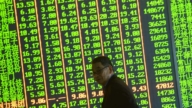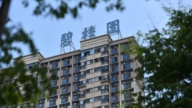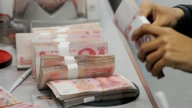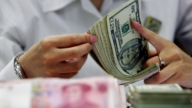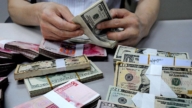【新唐人2013年10月05日讯】日本野村控股公司证券(Nomura Holdings Inc.)近日称,中共地方政府的债务规模最近几年扩大了39%,情况令人担忧。野村经济学家认为,中共决策当局可能会容忍明年部分地方政府债务出现违约,来加强市场纪律。这也就意味着,中共可能拉开地方政府破产的大幕。请看报导。
野村证券首席中国经济学家、报告作者之一张智威,在9月26号发布的报告中写道,截至2012年底,地方政府融资平台债务较2010年成长39%,达到19兆元人民币,这相当于国内生产总值(GDP)的37%。
张智威说,“流动性风险正在上升”。
他还表示,基于该银行对869个地方政府融资平台的调查研究显示,如果不是得到了地方政府支持,去年有超过一半的地方债务存在违约风险。
这份报告还指出,中共当局明年可能容忍一些个别信用违约发生,提高市场约束力,以此警示其他地方和投资人。
美国南卡罗莱纳大学艾肯商学院教授谢田:“违约的意思就是已经defoult了,就是破产了,那个债务就一笔勾销了,这个政府也破产了,然后其他谁投资谁倒楣了。”
美国南卡罗莱纳大学艾肯商学院教授谢田表示,“野村”提出的中共允许地方政府信用违约有两种可能,一种是证券证卷报的猜测,另一种是高层的放风,来试探国内外的动静。
北京天则经济研究所副所长冯兴元指出,在地方债务剧增的情况下,政府必然会发生违约。
北京天则经济研究所副所长冯兴元:“我计算地方政府的债务大概有40%到50%,占GDP,全国的总的债务已经达到86%到90%多。中国的很多县,它的负债额已经是地方财政的5到10倍,它根本就还不掉,实际上就是破产的。”
冯兴元认为,有资料显示,近两年地方政府的债务,几乎翻了一番,非常严重了。
最近几年,银行贷款与地方政府债务数额飙升,成为中国经济回升的主要驱动力。特别是,在08年4万亿的刺激下,大量专案上马,目前地方政府设立了超过10,000家融资平台为基础建设项目融资。但现在很多公司只能靠“借新还旧”度日。
北京师范大学MBA导师段绍译:“中国的政府是任期制,每一届政府要做它的业绩,要有政绩﹔但是,它可以把债务留给下一届政府。所以,任何一届政府它都只想花钱,不想还钱,就恶性循环,政府的债务越来越多。”
著名经济学家茅于轼唯一嫡传的弟子段绍译指出,如果中国的社会制度不改变,老百姓对政府依然没有任何监督、约束机制,这种现象就不能被遏制。
其实,在今年7月美国《彭博社》调查的经济学家中,有一半认为中共地方政府和企业不良负债,恐怕会对中国的信贷和经济成长产生“显着冲击”。
为此,中共中央政府采取了一系列举措,其中最明显的信号就是,国务院7月底下令对地方政府债务进行审计。
本月11号,李克强也公开表示,“对大家都很关心的中国地方政府性债务问题,我们正在采取有针对性的措施,有序规范和化解。”
谢田:“中小城市,很可能是一些不会太引起巨大影响的城市,然后让它们破产,不给它们帮助。破产以后呢,还会惩治一批官吏,可以杀一儆百吧。”
谢田认为,在中国向来是上有政策,下有对策,中共的这种方法也不能例外。但是那些没有根基、没有靠山的部分地方官员、民间企业投资者和一些私人企业就会成为受害者。
段绍译则认为,中共当局很容易就能通过多印钞票制造通货膨胀、炒高房地产价格等方式,转嫁债务危机到老百姓的身上。
采访/易如 编辑/宋风 后制/王明宇
China Allows Local Government to Default on Debt to Solve Economic Crisis
Japan’s Nomura Holdings Inc. recently released a report
indicating that China’s local government debt
has increased by 39% in recent years.
A Nomura economic expert believes that the Chinese
communist authority may allow debt default
in the local government in order to strengthen market
discipline, which may lead to local government bankruptcy.
Zhang Zhiwei, chief Chinese economist at Nomura Holdings,
and one of the report writers, wrote in the report released
on Sept. 26, “by the end of 2012, local government debt
was up by 39% compared to 2010, reaching 19 trillion yuan,
which is 37% of China’s GDP."
Zhang Zhiwei says, “Liquidity risk is going up."
He also indicates that without local government support,
over half of local debts would have had debt default risk
last year, according to a study based on 869 local
financial platforms.
The report says the CCP authority may allow debt default
in order to enhance market discipline as well as
to warn other places and investors.
Xie Tien, Professor, Aiken Business School, University
of South Carolina: “Default means bankruptcy.
The debt would be written off.
The government would go bankrupt, and then whoever
invested would be unlucky."
Xie Tien indicates that there are two possibilities why
Nomura Holdings’ report points out that the CCP allows
local government to default on their debt.
One is that the information was a guess
made by securities news.
The other is that the high level CCP releases some
information to probe reactions at home and abroad.
Deputy Director of Beijing Unirule Institute of Economics,
Feng Xingyuan, says the government has
to default under the conditions of a sharp local debt increase.
Feng Xingyuan: “I calculated the local government debt.
It’s about 40% to 50% of the GDP.
The nation’s total debt is about 86% to 90% of the GDP.
China has many counties whose debts are five to 10 times
that of the local finances.
They definitely can’t pay off.
They are in fact already bankrupt."
Feng Xingyuan believes that there’s information showing
local government debt in recent two years has doubled.
It’s very serious already.
Bank loans and local government debt has soared
during recent years, which is the major driving force
of China’s economic rebound.
Especially, provoked by four trillion, many projects
were launched.
Local governments have established over 10,000 financial
platforms to get funding for infrastructure projects.
But many companies have to borrow money to pay debt.
Duan Shaoyi, MBA instructor at Beijing Normal University:
“The Chinese government is a tenure system.
Every session of the government want results,
political achievements.
But, they can leave the debt to the next session.
Thus, every session of government only wants to spend
money but doesn’t want to pay debt.
It’s a vicious cycle.
The government debt is more and more."
Duan Shaoyi, protégé of famous economist Mao Yushi,
says if China’s social system doesn’t change,
people won’t have supervision
and restraint mechanisms over the government.
Then, people can’t contain the increasing debt.
Half of the economists in the research published
in Bloomberg this July believe that the CCP local
government debt and company debt will have
an “obvious impact" on China’s credit and economic growth.
The CCP central government has taken a series of actions.
The most obvious signal is that the State Council ordered
an audit of local government debt this July.
On July 11, Li Keqiang said,
“We are taking specific measures to regulate
and resolve the local government debt issue
that everyone is concerned about."
Xie Tian: “The CCP authority will probably allow the small
and medium sized cities that won’t have a big impact,
to bankrupt and give no help to them.
After their bankruptcy, the authority will punish
a bunch of officials to warn others."
Xie Tian believes that China always has policies
and counter measures.
This time is no exception.
Without backing, local officials, civil enterprise investors
and some private enterprises will become victims.
Duan Shaoyi believes that the CCP authority
can easily print a lot of money, create inflation,
and push up real estate prices,
which passes the debt crisis to the people.



